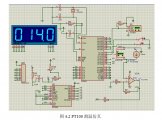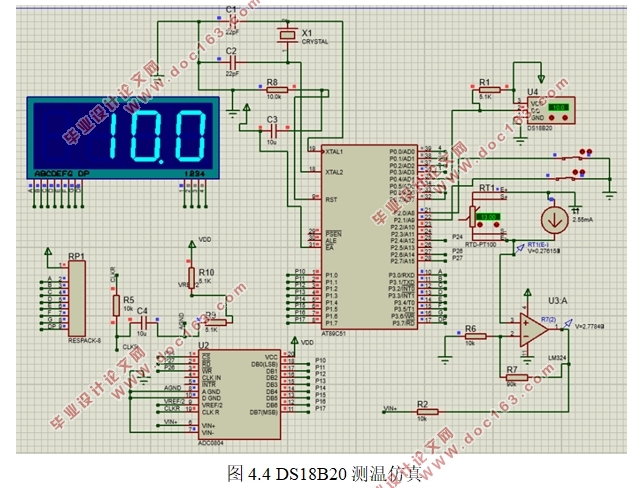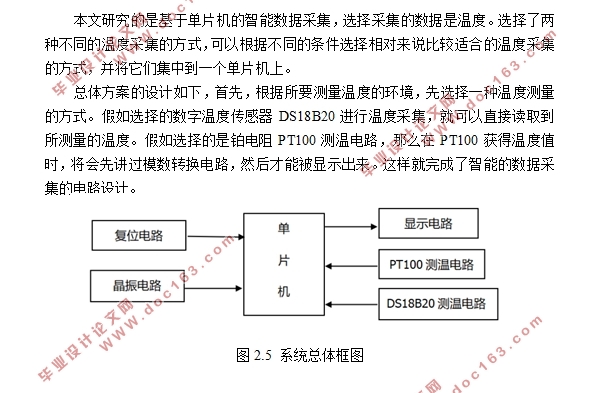基于单片机的智能数据采集系统的设计

基于单片机的智能数据采集系统的设计(任务书,开题报告,外文翻译,论文12000字)
摘 要
本文进行了研究了基于单片机的智能数据采集系统,目的是实现智能的数据采集,根据不同的环境有不同的温度采集方法。在现在,在人们的生活工作中离不开温度采集,大多都会采用无线设备进行温度检测。
经过对比之后选择了两个温度采集方法,一种是基于PT100铂电阻的采集方法,PT100的阻值会随着温度的变化而变化,由PT100的阻值的变化来表现温度的变化,然后将其与数模转换器件ADC0804相连接,把其转换成数字,然后输入到单片机中;另一种是基于数字温度传感器DS18B20的采集方法,由于DS18B20采集到的数据已经是数字了,可以将其直接接入到单片机内。
论文主要研究的是基于单片机的不同的温度采集方法,根据周围的环境选择合适的温度采集方法,达到智能数据采集的目的。经过不断的测试,基本实现了论文的要求。
关键词:PT100;DS18B20;单片机
Abstract
In this paper, the intelligent data acquisition system based on single chip computer is studied. The purpose is to realize intelligent data acquisition. There are different temperature acquisition methods according to different environments. Nowadays, temperature acquisition is indispensable in people's life and work. Most of them use wireless devices to detect temperature. [资料来源:http://Doc163.com]
After comparison, two temperature acquisition methods are selected. One is based on PT100 platinum resistance. The resistance of PT100 varies with the temperature. The resistance of PT100 varies with the temperature. The resistance of PT100 varies with the temperature. Then it is connected with ADC0804 and converted into digital. The other is based on digital temperature sensor. DS18B20 acquisition method, because the data collected by DS18B20 is digital, it can be directly connected to the microcontroller.
The main research of this paper is based on different temperature acquisition methods of single-chip computer, according to the surrounding environment to select the appropriate temperature acquisition method, to achieve the purpose of intelligent data acquisition. After continuous testing, the requirements of the paper are basically realized.
Key Words: PT100; DS18B20; MCU
本文研究的是基于单片机的智能数据采集,选择采集的数据是温度。选择了两种不同的温度采集的方式,可以根据不同的条件选择相对来说比较适合的温度采集的方式,并将它们集中到一个单片机上。
[资料来源:http://Doc163.com]
总体方案的设计如下,首先,根据所要测量温度的环境,先选择一种温度测量的方式。假如选择的数字温度传感器DS18B20进行温度采集,就可以直接读取到所测量的温度。假如选择的是铂电阻PT100测温电路,那么在PT100获得温度值时,将会先讲过模数转换电路,然后才能被显示出来。这样就完成了智能的数据采集的电路设计。
[资料来源:https://www.doc163.com]



目录
第1章 绪论 1
1.1 研究的意义 1
1.1.1 智能数据采集的意义 1
1.1.2 温度采集的意义 1
1.2 国内外研究现状 1
1.2.1 智能数据采集的现状 1
1.2.2 温度采集的现状 2
1.3 本设计研究内容及目标 3
1.4 论文章节安排 3
第2章 方案选择 4
2.1 单片机芯片选择 4
2.2 测温方式选择 4
2.2.1 铂电阻选择 5
2.2.2 数字温度传感器选择 5
2.3 AD芯片选择 6
2.4 显示方式选择 8
2.5系统总体方案设计 9
第3章 电路设计 10
3.1 单片机最小系统 11
3.1.1 复位电路 11
3.1.2 晶振电路 12
3.2 PT100测温电路 12
3.2.1 PT100测温选择 12
3.2.2 AD转换电路 13
3.3 DS18B20测温电路 15
3.4 显示电路 17
3.5 控制电路 18
3.6系统整体电路设计 18
第4章 仿真分析 19
第5章 结论与展望 21
5.1 结论 21
5.2 展望 21
参考文献 22
致谢 24 [来源:http://www.doc163.com]
